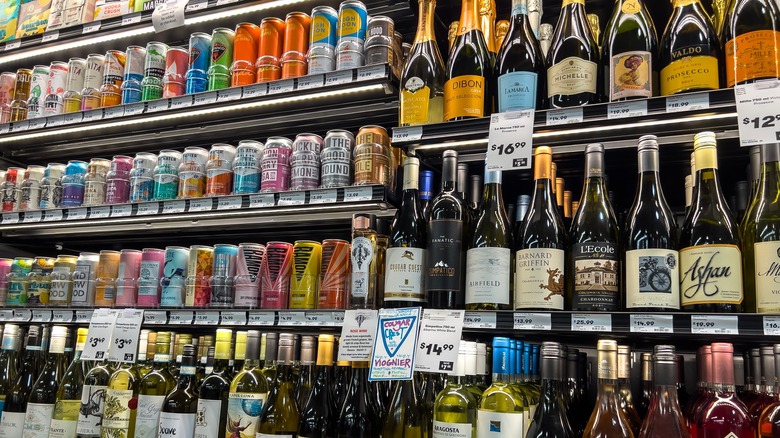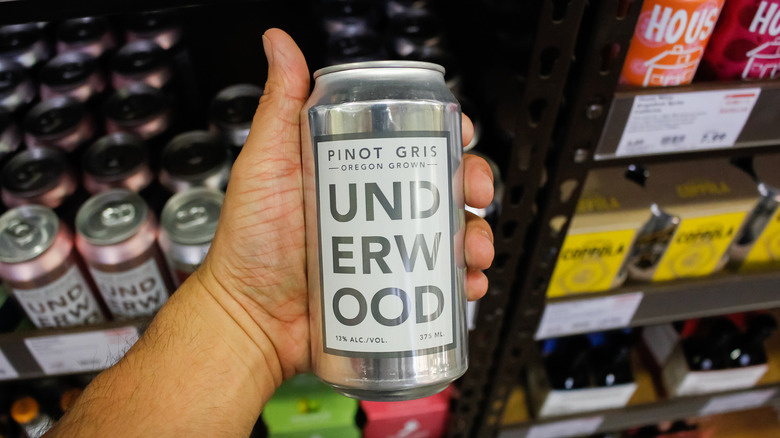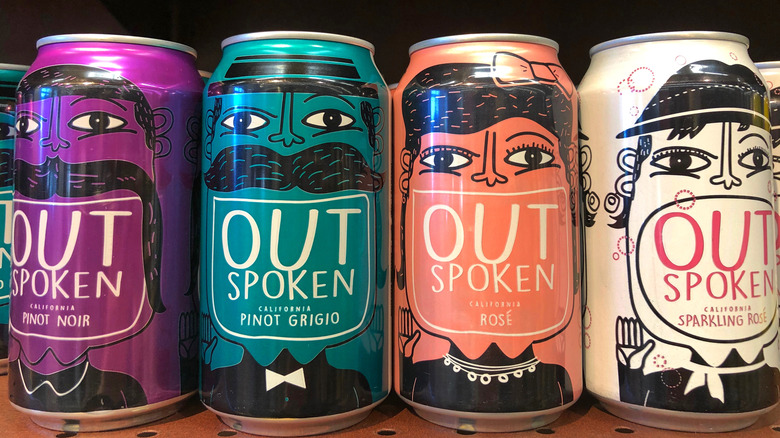You May Want To Think Twice Before Choosing Canned Wine Over Bottled
Canned wine is not a new phenomenon. Yet, in recent years there seems to be a growing movement toward these beverages, and the market is expected to expand exponentially. And we totally get the hype: Canned wine is portable, light, tasty, and perfect for a sunny afternoon. But before swapping out all your bottles of New Zealand Sauvignon Blanc and gloriously deep Pinot Noir for their travel-friendly counterparts, there are a few things to consider.
Even though canned wines are becoming increasingly popular, there's a reason why they used to have a bad reputation. Earlier renditions of aluminum cans didn't have the proper inner coating to prevent wine from coming into direct contact with the metal. This led to wonky-tasting wine and metallic flavors overpowering the grapes.
But with that problem now solved, another arises. For one, think about how the vessel holding your beloved wine impacts how long it will last. One thing to consider, amongst many, that will lead you to your own conclusion on whether to grab a can or not.
To can or not to can?
Unlike some bottled wine, which can be stored away for years, canned wine has an average shelf life of 18 months; it's the kind of treat you won't be putting away for a rainy day. The short shelf-life consequently means that some wines cannot (and never will) be put in a can. Age is a flavor you can't can. Alongside the aging benefits wine bottles provide, the coloring of wine bottles also serve a purpose — to protect the wine against UV rays, which could potentially alter the flavor. Cans do not have this advantage.
Additionally, canned wines can contain BPA (bisphenol A), which can be potentially damaging to health when consumed. BPA has been shown to cause cancer, irregular brain development, and heart disease, just to name a few. Canned wines also often contain double the sugar, especially in white and sparkling wines.
So, how about the quality of canned wine? If you're a seasoned wine drinker, you probably have your own quality standards. Still, if you're wondering how to assess, looking for reputable winemakers or certifications from a particular vineyard is best. Reviews on canned wine might be scarce, particularly if it's a new brand (and there are many).
Use your own judgement
While you may have learned a few surprises about canned wine, it doesn't beat the fact cans are incredibly accessible. They are portable, convenient, and considerably more lightweight than bottles. While the canned exterior may not hold up against UV rays, it is extremely efficient at cooling wine faster. Bottled wine needs a good one or two hours in the fridge, whereas cans can chill in half the time. A good reason to go with a rosé or white!
Cans are also a delightful way to explore different grape varieties. Sure, the overall diversity of wines in cans is still minute compared to the thralls of wine varieties in bottles, but the smaller size allows you to try more without the commitment of finishing a bottle. Cans are also an excellent alternative for those who feel a little intimidated by removing corks (or those who worry about corked wine). Finally, canned wine is unashamedly stylish. The cool designs in varying hues and shades are as much a fashion statement as craft beer cans.
Now that you're aware of some of the differences between canned and bottled wine, you can confidently decide which is right for you. And unless you plan on drinking it right away, a bottle is the way to go.


